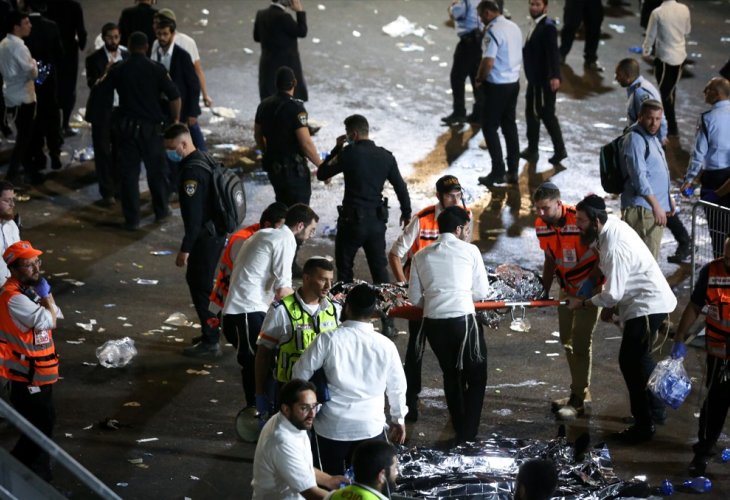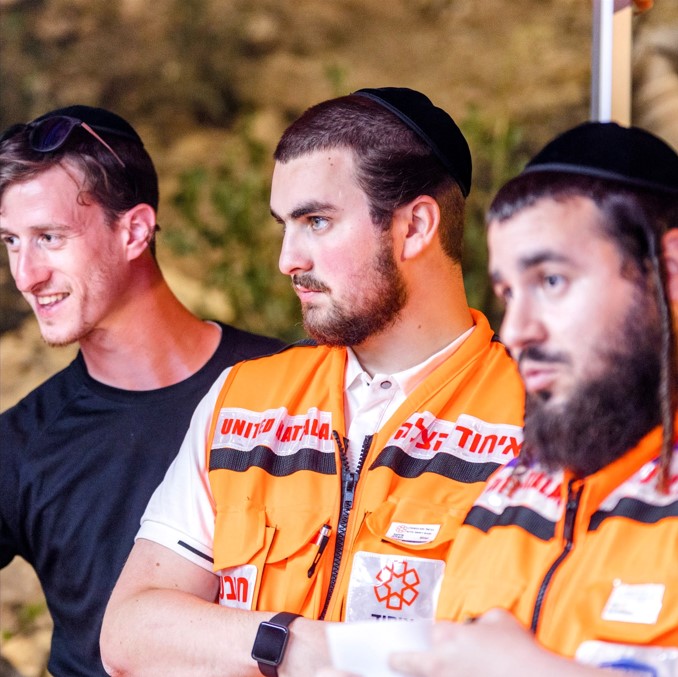Two Years Since the Meron Tragedy: 'I Began to Lose Consciousness'; The Rescuer: 'I Saw a Hand Closing and Launched Forward'
They were attending the Rashbi's celebration at Meron during those fateful moments when the severe tragedy that claimed the lives of 45 people occurred. One was among the injured and nearly lost his life, while the other, a MDA medic, was the divine intervention that saved him. A joint interview for 'Hidabroot'.
 (Photo: David Cohen / Flash 90)
(Photo: David Cohen / Flash 90)They were there, at the scene of Israel's largest civilian disaster: one, Hershel Morgenstern, wearing his medic hat; and the other, Moshe Helfgot, as one of the celebrants at a gathering that ended in tragedy.
"It was my first year in Meron. I vividly remember what happened there," Helfgot, a Hasidic yeshiva student from Kiryat Gat, tells us. "I arrived at the place excited since my Gur Hasidic sect doesn't send youths to Meron. I had married a few months earlier and used the first opportunity after my Bar Mitzvah to come along with all of Israel to the site of the holy Tanna."
Helfgot arrived with three friends. They entered the mountain, prayed, and after some time decided to attend the main lighting ceremony of the Toldot Aharon Hasidim. "We started ascending towards the Hasidic lighting area, moving from the lower level towards Reb Dov's bridge. We didn't know that at the time the large lighting ceremony was nearing its end, and the masses were starting to leave exactly the same way we intended to climb. But even if we had known, I doubt we would have altered our plans. Who could have believed that the crowd could lead to such a heavy disaster?" he rhetorically wonders.
"We started climbing," Helfgot continues, "but then the crowd began intensifying. Dozens of people climbed alongside us, and from above, masses started descending. The pressure created by this was immense, and we realized we wouldn't be able to enter the lighting ceremony. The tragic directions, such as struggling to leave unharmed, didn't occur to us at that moment."
Given the situation, they decided to stay at Reb Dov's bridge for the time being and not enter the lighting area itself, trying to participate, even from afar, in the main lighting of the Jerusalem Hasidic community.
"After a few more seconds, it seemed the lighting had ended, and masses of people began leaving the area," he recounts the hard moments when everything began. "The crowding was terrible, and we realized we needed to leave as quickly as possible. We started descending, walking on the slope leading out. I was walking first, with my two friends following behind. My position – as I later realized – was a disadvantage."
 Hershel Morgenstern (center)
Hershel Morgenstern (center)"Pushing That I've Never Experienced"
"We expected a little pushing," he explains what happened at those moments, "but the degree of pushing was something we had never experienced and never thought we would experience. It was pushing that prevented a person from standing on their feet." As a result, they began being swept along. "We simply 'traveled' with the crowd, and that's how I got to the steps, where the second scene of the disaster unfolded. It happened in a few brief moments when, at one moment, I understood that people were starting to fall on each other there, and I realized that a disaster was imminent."
A few seconds later, Helfgot also fell alongside the crowd. "Another person fell on top of me, crushing my body while I was left half-standing, half-lying over the steps, with a row of people beneath me. To this day, I don't know what happened to those underneath."
For long seconds, Helfgot lay in the disaster zone. "I actually believed those were the last moments of my life, but luckily, I had a little air because my head was outside the pile of people, although the ability to breathe was slowly slipping away." He saw people beside him who had passed away or were moments before their passing and understood, to his horror, that he could be next. "I couldn't even recite the Shema prayer," he recalls with a trembling voice.
At this point, Helfgot lost consciousness, so he doesn't know what happened during those moments when he lay unconscious. Hershel Morgenstern, who was at the nearby United Hatzalah station, fills us in. "I serve as a senior medic in United Hatzalah," he says. "During the event, I was sitting with the equipment box when a dispatcher came to me shouting to bring him the administrative radio. Initially, I refused. You don't just give the device to anyone unless there's higher clearance, but he shouted 'mass casualty event.' I thought he was exaggerating, but when I opened the device, I heard the cries and therefore agreed, though I still didn’t understand the complexity of the situation.
"Then I quickly grabbed the first aid kit and ran to the scene. Ten minutes after the initial report, I ran out to the scene at top speed. I made my way with other dispatchers, carrying stretchers as we ran. Our footage of us running like that would later become part of public memory of the disaster," he notes.
"About seventy seconds after the call, I arrived at the scene. When I got there, darkness fell over my eyes. On the way, thoughts crossed my mind about different scenarios, like a bleacher collapse or something, but I couldn't imagine in my darkest dreams the scene I arrived at: a pile of people approximately five feet high, lying on top of each other, some of whom were already lifeless. Nothing can prepare someone for such a sight. Alarmingly, there were no screams when we arrived. Those lying there couldn't scream, whether because they were killed or severely injured, or because they no longer had the strength to do so.
"In those hard moments, I saw a hand starting to close. I realized it was someone now losing consciousness. That person, who later I found out to be Moshe Helfgot, was lying atop most of the people. I decided to try to save him, understanding that in these moments, every second is critical to his rescue. A police officer stood next to me, and I convinced him to help. At first, he refused, asking 'why him?' but I persisted. I understood that the young yeshiva student's chances of survival were diminishing with each passing second, with survival probability dropping by 10% every ten seconds – from the time we could get him off the pile to actually resuscitating him.
"Before asking to save him, I indeed hesitated," he shares a bit about the chilling spirit prevailing there in those difficult moments. "The reason was that to reach him, I'd understood I'd have to let go of others. The dilemma was terrible, and I wouldn’t wish it on anyone. But ultimately, I decided to save him. We pulled him, the police officer and I, with great force and managed to extract him from the pile. I didn't perform CPR on him. Instead, I moved on to rescue more people, leaving him to be cared for by medics behind me. Thus, I continued from one person to another, and later performed eight resuscitations at the scene, at which point I collapsed from exhaustion and trauma combined.
"At those moments, I had no leisure to think about what had become of the young yeshiva student I took from the pile. But a few days after the event, when I was revisiting what I'd gone through during those difficult moments, I became very curious to know his fate."
At this point, Helfgot continues his story. It turns out that after Morgenstern rescued him from the pile, he regained consciousness. "I woke up near the stairs," he recounts. "I felt pain all over my body. It later turned out that my leg was shattered, and I was also injured in other areas. Since I was among the first to be rescued, I had the opportunity to be evacuated from the scene by ambulance quickly. Already while on the way, I understood the magnitude of the event, and at the hospital, I was told that many of those who stood beside me had died."
During the first year following the disaster, Helfgot had to undergo a series of treatments. "After surgery on my leg, there were months of physical therapy, visits to orthopedic specialists, and repeated examinations. The experiences there haven't ended," he says. Helfgot adds that to this day he doesn't understand how he was saved while others were left behind: "I've carried the events from there ever since. The memories don't fade. I have another reason to remember the disaster – today I walk on healthy legs, knowing it's not to be taken for granted."
Nonetheless, Helfgot is determined to keep attending Meron: "I want to go there to thank Hashem for the miracles and kindness He did with me." And if he's thanking, he tearfully mentions how that event showed him the beautiful face of the Jewish people: "I met many good people along the way, like Meir Levi, my friend, who despite being injured insisted on coming with me to the hospital; the hospital rabbi Israel Kopilovitz from Ziv, who helped generously; Israel Klein from Agudath Israel, who also assisted throughout; and many others who came to the hospital to bring us food and supplies."
After a moment of thought, Helfgot adds: "And of course, above all, I owe special thanks to Hashem and the special emissary He sent to rescue me, United Hatzalah's Morgenstern, who saved my life." This gratitude Morgenstern heard personally, after meeting Helfgot himself. When asked how they met, he recalls that after the Meron event, he shared with his friends what had happened: "At some point, I met Helfgot's cousin, who is a friend of mine, and I shared what I had gone through in Meron. The cousin was alarmed and quickly checked whether it was his cousin. Within about a day, he sent me Helfgot's photo, and although he looked different at those moments, I managed to recognize him immediately. In the days following, I quickly went to his home to visit him. It was an emotional meeting. No matter how I describe it, I can't convey how emotional it was. The circle closed for me when a daughter was born to him shortly thereafter. Thanks to Hashem, who sent me to save him, she wasn't born an orphan, Heaven forbid," he says with enthusiasm.

